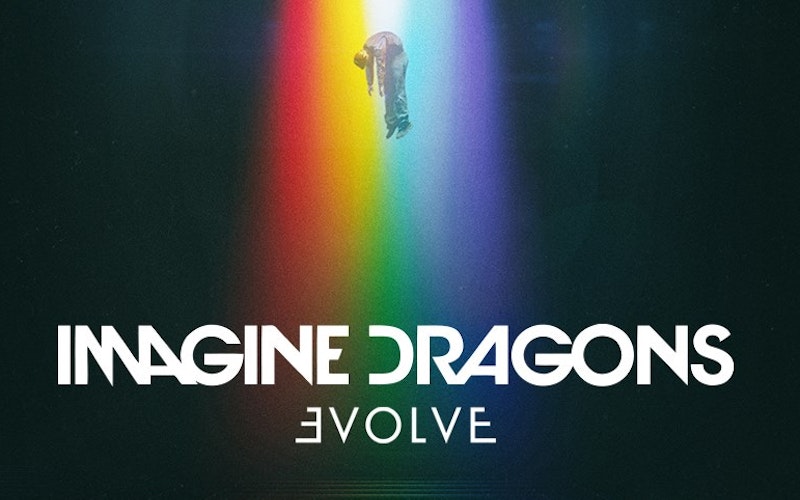
Music
The Sneaky Simulation of Imagine Dragons’ Evolve
Sitting around empty bowls of soup, my brother was recounting some of his experiences working at a theme park a few summers ago. He was bemoaning the lack of roller coasters at the park: “It seemed like every new ride was a simulator. I mean, I get it. They take up less space; they’re cheaper. But it’s no match for the real thing.” In 2017, simulated reality surrounds us. Imagine Dragon’s Evolve encapsulates this moment in popular culture perfectly.
As the name indicates, Evolve is a slightly different musical direction for the Las Vegas crew known for arena rock. Pop culture is currently obsessed with EDM—electronic dance music—and Imagine Dragons joins the movement, as “I Don’t Know Why” opens with blips and synth haze reminiscent of the score for Netflix’s Stranger Things.
On Evolve, lead vocalist Dan Reynolds weaves together intense feelings and first-person sensations. In “Whatever It Takes,” he celebrates the adrenaline of success against the odds. The album’s hit single “Believer” proclaims, “Pain! You made me a, you made me a believer … my life, my love, my drive came from … pain!” Later, he encourages his lover to enjoy the fleeting exhilaration of make-up sex in lieu of promises broken. With Queen-inspired harmonics, “Yesterday” celebrates living in the euphoric present: “No tomorrow without a yesterday … I haven’t got one single regret, no.” Imagine Dragons’ thumping drums couple with resounding choruses on several songs to build the tension and release common in EDM.
It’s a curious thing to listen to music that is a mixture of produced and recorded sound. The tracks are a blend of synthesized beats and studio recordings. It’s even more curious how Imagine Dragons can maintain their big arena rock sound even though several tracks of each song are generated by a computer. Evolve aims at an expansive, live feel, as though you are hearing the album performed from a huge stage outfitted with pyrotechnics.
What’s the secret? Simulation. It turns out that a producer can simulate expansive depth on a record. EQ, reverb, and delays clip the upper and lower sound frequencies and distort the sound with echo to make it feel more distant. This pushes certain instruments and tracks back stage, sonically speaking. In contrast, crisp, louder vocals draw the lead singer to the front of the “stage.” This all works together to “cement the illusion” of a vast, three-dimensional space in our tiny earbuds.
Simulated thrills are intense but fleeting. Our souls were made for something different.
Interestingly, Evolve begins and ends in the same place: darkness. While Evolve starts as a flush of intense desire between “strangers in the night … passing in the shadows” (“I Don’t Know Why”), it ends with the dispassionate invitation, “If you ever wanna join me baby, I'll be dancing in the dark” (“Dancing in the Dark”). Perhaps unintentionally, Imagine Dragons’ latest becomes a fitting metaphor for a simulation culture—people chasing raw feelings and desires in the dark.
I was struck by how the producing on Evolve reminded me of Hillsong United and Elevation Worship. After all, worship music thrives on the feeling of presence—as though we are worshipping in a crowd of 30,000 people—which is why many worship bands release live albums. In “Walking the Wire,” Reynolds encourages us to put our hands over our headphones, close our eyes, and “feel the wind in your hair / Feel the rush way up here.” It’s a simulated fellowship. In our imagination, he is close enough to promise, “I’ll take your hand when thunder roars.”
Simulation is all around us. And I don’t just mean those Samsung VR goggles. Social media can become a simulator for real friendships. Pornography is a simulator for real sexual encounters. Even online or podcast sermons can become simulators for church. We want feelings without experience. We want fellowship without presence. Ultimately, we begin to sound a lot like Reynolds at the close of the album, when he admits, “Most days I’m keeping to myself / Living in my little bubble.” When we try to substitute simulated fellowship for actual presence with our friends, our church, our families, and our communities, we eventually realize “all this distance [is] taking its toll” (“Start Over”).
Simulated thrills are intense but fleeting. Our souls were made for something different: true fellowship with God and man. In his new book The Tech-Wise Family, Andy Crouch writes, “Technology is in its proper place when it helps us bond with the real people we have been given to love. It’s out of its proper place when we end up bonding with people at a distance, like celebrities, whom we will never meet.” Perhaps Evolve can move us to evaluate how much the technology in our lives builds our friendships and fellowship with others—and how much we allow it to become a substitute.
We should never settle for the arena feel. Imagine Dragons produced Evolve to make you want to join them in that arena. But we were made for more—for flesh and blood relationships, for presence, for true fellowship. On their previous album, Smoke + Mirrors, Reynolds sang, “I want to believe … but all that I hope, is it just smoke and mirrors?” Isn’t simulation just a game of smoke and mirrors? Evolve pushes us to wonder, am I being fooled? Or am I willingly fooling myself?
Topics: Music, Culture At Large, Arts & Leisure